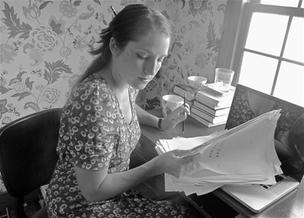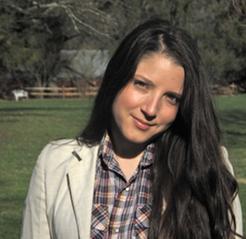
|
|
| photo: Eamon Hamilton | |
Koren Zailckas is the author of two memoirs, Smashed and Fury, and lives in New York's Hudson Valley with her husband and three children. Mother, Mother is her first novel. She recently tweeted: "33 with 3 books and 3 kids. #birthdaysymmetry."
Where did you get the idea for this distressing mother figure?
I really wanted to challenge the cultural assumption that all mothers are inherently selfless. We're living in an era of baby-bump obsession, in a don't-speak-badly-of-your-momma culture. Read an Angelina Jolie profile or watch TLC and you'd think women enter delivery rooms as laboring heffalumps and exit as Battista Salvi's Madonna and Child. But the word "mother" isn't synonymous with Mother Teresa, and having a child doesn't make a woman a mom any more than owning a paintbrush makes her Frida Kahlo.
This idea that all mothers are naturally patient, forgiving and self-sacrificing isn't just sappy-sweet, it's dangerous. It discounts experiences by those of us who were raised by women whose genetics and early life traumas permanently altered their brains and made them incapable of empathy. Here's the sick truth: some mothers aren't naturals.
Mother, Mother's Josephine Hurst isn't just a critical or controlling mom. She's a narcissistic mother, and she's in good company. Loads of women--one out of 10 Americans, according to new studies--have Narcissistic Personality Disorder, which many shrinks consider untreatable. I hope Josephine will give shivers of recognition to anyone out who grew up with a narcissistic mother. I hope Josephine puts a name--NPD--to longstanding patterns of maternal chaos. As for those lucky folks who grew up with the mother of Mother's Day Cards, I hope Mother, Mother gives them at least a glimmer of the fear that resides in the hearts of kids like Will Hurst.
You wrote two memoirs before this novel. Was this your first try at fiction? And how was it different?
Yep, this was my first attempt at fiction. Mother, Mother brought me back to Smashed in that way. Smashed was my first prose. Before that, I'd only written poetry and interoffice memos.
Fiction required a lot more restraint than memoir. By design, memoir is an exercise in over-sharing. Fiction feels more like real intimacy, especially when it comes to psychological thrillers, suspense stuff. You reveal things slowly to the reader, over the course of your time together. Not every character has to be hyper self-aware all the time, owning every character flaw, aware of their deeper motivations. You can gently fold in a hint, here and there. Teaspoon of backstory. Foreshadowing to taste.
I still find that really difficult from time to time. My husband's pet name for me is "Spoiler Alert." I might well have told you how the Hursts end up in Mother, Mother's first chapter were it not for my long-suffering editor. She probably has carpal tunnel from all the times she went back to the manuscript to slash out obvious clues.
Did you research Asperger's syndrome in order to get it exactly as right as you did? Did any other aspects of this novel require research?
I did a little bit of research. But mostly, I manifested Will's Aspergers in a way I could relate to.
Will's intense focus, his "Aspie interest," is language. He's like a collector of rare and precious objects, and in this case, those objects are unusual and arcane words. Autotonsorialist: one who cuts their own hair. Misodoctakleidist: someone who hates practicing piano. Awkwardness ensues whenever Will uses them in spoken conversation, but he just can't help himself. He's addicted.
Will may actually be a burgeoning writer. As a writer, you spend so much time alone, trying to think of funny and fresh ways to describe everyday things. Then, when it's time to go out into public, you forget that you don't have to agonize over word choices. When you're chatting about weather with your neighbors at the farm stand, you can just say, "It's pouring." People look at you funny when you go all Du Maurier and say, "Can you believe this lashing, pitiless rain?"
 |
|
| photo: Eamon Hamilton | |
How did you manage to include humor in such a very dark book? How would you characterize your style of humor?
I suppose I've always had a touch of gallows humor. That self-lacerating, inverted kind. Also, a bit of that bone-dry, stuff-your-feelings, British humor, too. (Maybe that's why I married an Englishman.) Also factor in a little bit of defeatist attitude. I've always related to that George Bernard Shaw quote: "If you can't get rid of the family skeleton, you might as well make it dance." I think it's really important for dark, scary books to be funny. Every few pages, I really wanted there to be at least a restorative chuckle, something to lighten the mood from jet-black to slate.
Some of the creepiest ladies in the history of literature are also the funniest. Shirley Jackson is hilarious. I wish she were still around today, if not only so her mommy-memoirs could be optioned for a self-starring reality show. Take Life Among the Savages... beginning each morning with the very real fear that you will slip on a Matchbox car or doll's broken arm and break your neck on the stairs is morbidly priceless. In my experience, once you become a mother everything is doubly terrifying and laughable. It only seems natural to mix the two together. (Although that could just be the sleep deprivation talking.)
The dual first-person perspectives are very unsettling (in a good way). How did you choose that format?
I think sheer panic drove me. When I first started thinking about fiction, many years ago, I said, "I'm going to write a first-person, one-perspective novel." Just like that. All fresh-faced bravado.
Initially, with Mother, Mother, I thought (quite cowardly) that I'd hedge my bets between Will and Violet. I thought: double the characters, double the action. Never a dull moment. From there, it became a much more strategic, much more about how "family," as a concept, is a bit like "car crash." Everyone experiences it from a different perspective. So why not let the reader get two points of view on the Hursts?
Since you came from writing memoirs, how present are you in Mother, Mother? Did you have to fight putting yourself in this book, or was it a relief?
I think there are snippets of myself and my childhood all over this book. That said, the Hursts are a prime example of writing what you know, then taking it to a level that is psycho-extreme. I've been reading Eric Booth's The Everyday Work of Art, and he has a great line about how the word "art" in its infancy was a verb that meant "to put things together." And the process of writing Mother, Mother really felt like that. Marrying personal experience to the psychological profile of narcissistic mothers. Piecing together recurring nightmares with irrational fears, Frankenstein-ing in ordinary scenes from a modern, American, family life.
You know, it was a relief. I feel like doctors should prescribe thriller-writing to anyone with anxiety or PTSD. You get to be in charge of your fear. And, of course, you get to change the outcome. In real-life dysfunctional families, roles shift, but there's not much change.
What have you read and loved lately?
This is really the golden age of women's psychological fiction, and for the past few years I've been gobbling up everything by Tana French, Gillian Flynn, Laura Lippman, Megan Abbott, Kelly Braffet. It's just too exciting to look away.
That said, I have three children under four, so I've also have Mo Willems on heavy rotation. That's my life at the moment: murder and The Pigeon Finds a Hot Dog. --Julia Jenkins

